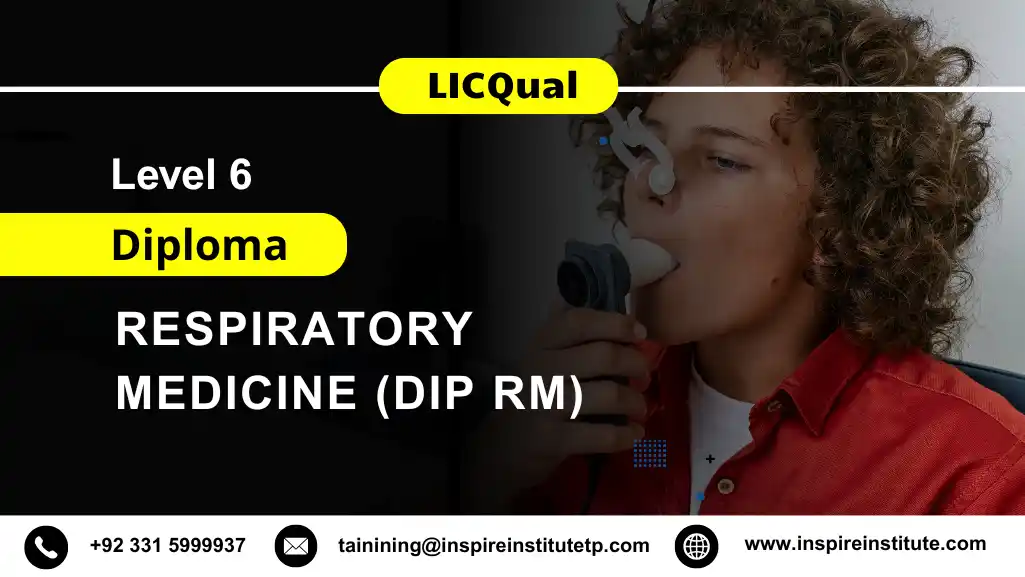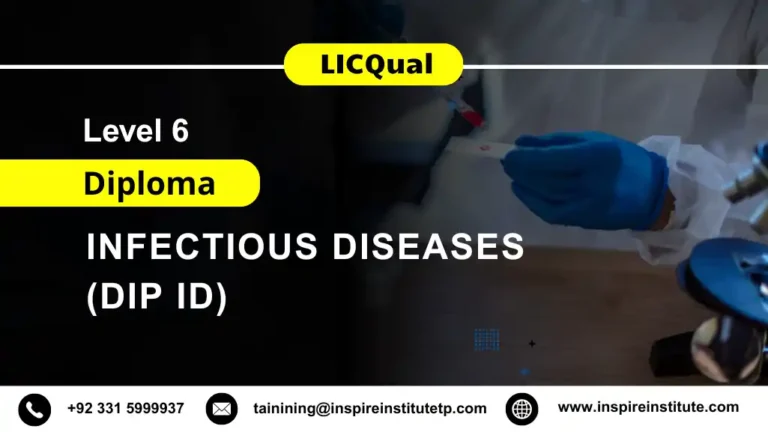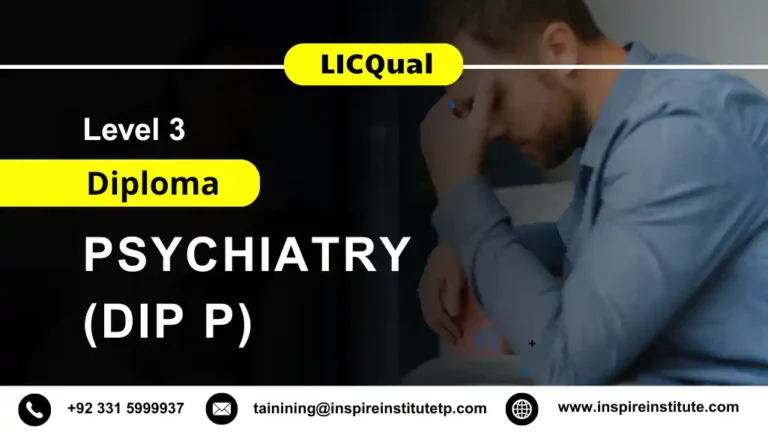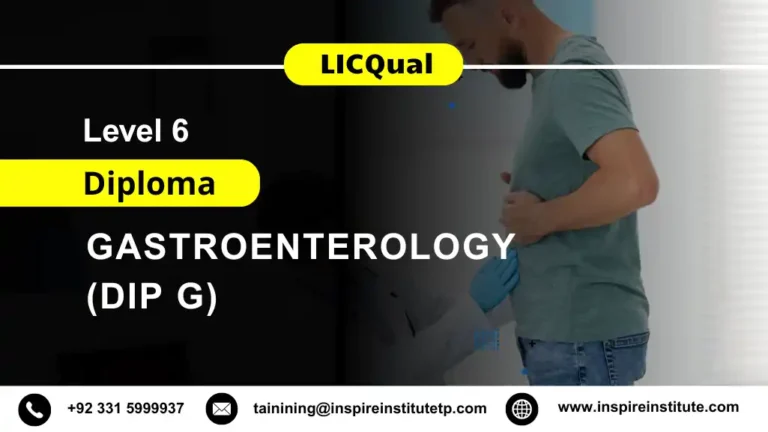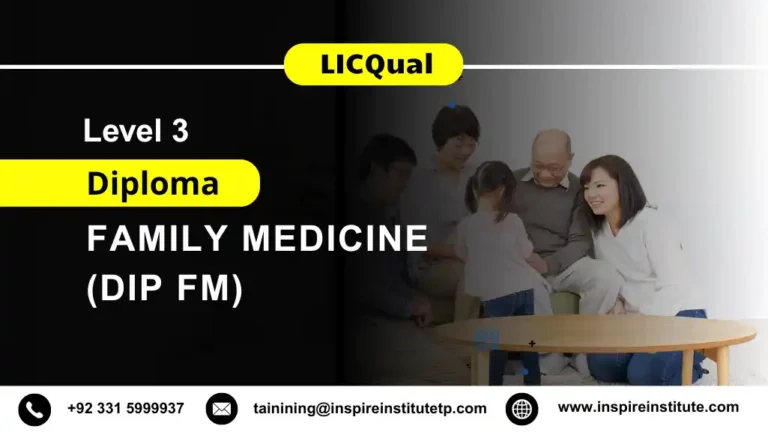LICQual Level 6 Diploma in Respiratory Medicine (Dip RM)
The LICQual Level 6 Diploma in Respiratory Medicine (Dip RM) is a UK-accredited qualification designed for healthcare professionals, respiratory therapists, pulmonologists, and medical practitioners seeking to enhance their expertise in respiratory care, diagnosis, and treatment. Respiratory medicine is a critical field, given the increasing prevalence of chronic respiratory diseases, including asthma, COPD, and interstitial lung conditions. This comprehensive diploma equips learners with the advanced knowledge and practical skills necessary to manage respiratory disorders effectively and improve patient outcomes.
The course is structured to provide a deep understanding of respiratory anatomy, physiology, and pathology. Learners gain insights into lung function assessment, advanced diagnostics, and evidence-based treatment strategies. The curriculum covers acute and chronic respiratory conditions, ventilatory support, pulmonary rehabilitation, and emerging respiratory therapies, preparing learners to tackle complex cases with confidence. High CTR keywords such as “Respiratory Medicine Diploma,” “Pulmonology training,” and “UK-accredited respiratory course” are integrated naturally to enhance visibility and ranking.
Flexible learning is built into the assignment-based structure, allowing healthcare professionals to balance work commitments with academic advancement. Digital resources, guided mentorship, and structured support ensure learners progress at their own pace while mastering critical respiratory medicine concepts.
Through engagement with the latest research, clinical guidelines, and innovative therapies, learners develop the ability to apply evidence-based respiratory care strategies. The LICQual Level 6 Diploma in Respiratory Medicine empowers professionals to deliver high-quality, patient-centred care, strengthen clinical decision-making, and advance respiratory healthcare standards globally.
Why Choose this Qualification
The LICQual Level 6 Diploma in Respiratory Medicine (Dip RM) is a UK-accredited, assignment-based qualification designed for healthcare professionals, pulmonologists, and respiratory practitioners aiming to advance their expertise in respiratory care. This course equips learners with comprehensive knowledge of respiratory disorders, advanced diagnostics, treatment strategies, and patient management skills. By combining theoretical foundations with practical applications, this diploma prepares learners to excel in clinical and research environments, enhancing career opportunities while improving patient care outcomes.
Key Reasons to Choose this Qualification
Specialist Knowledge
- Gain an in-depth understanding of respiratory system anatomy, physiology, and pathology.
- Explore advanced diagnostics, ventilatory support, and pulmonary rehabilitation techniques.
- Learn to manage chronic and acute respiratory conditions, including asthma, COPD, and interstitial lung diseases.
- Understand pharmacological interventions, evidence-based therapies, and innovative respiratory treatments.
- Develop expertise in patient assessment, monitoring, and management across diverse clinical settings.
Practical Application
- Apply knowledge through case studies, simulations, and research-based assignments.
- Develop hands-on skills in patient assessment, ventilatory management, and care planning.
- Implement evidence-based strategies to manage complex respiratory conditions effectively.
- Collaborate with multidisciplinary teams to improve treatment outcomes.
- Gain confidence in clinical decision-making and problem-solving in real-world scenarios.
Recognised Qualification
- Earn a prestigious UK-accredited diploma that validates professional competence.
- Enhance credibility in hospitals, specialist clinics, and research institutions worldwide.
- Open doors to advanced roles in pulmonology, respiratory therapy, and healthcare management.
- Meet international standards, making the qualification globally recognised.
- Strengthen your professional profile for academic or leadership opportunities.
Flexible Learning Pathway
- Study at your own pace without interrupting professional commitments.
- Access digital learning materials, guided mentorship, and structured support.
- Balance work and study efficiently through an assignment-based approach.
- Benefit from online resources and interactive learning modules.
- Tailor your study plan to suit personal and professional needs.
Evidence-Based Training
- Engage with the latest research, guidelines, and innovative respiratory practices.
- Develop skills in critically evaluating scientific literature and clinical data.
- Apply validated strategies to improve patient outcomes and care quality.
- Stay updated with advancements in diagnostics, therapy, and pulmonary care.
- Enhance analytical and clinical reasoning abilities for evidence-based decision-making.
Career Development
- Expand career prospects in hospitals, specialised clinics, research, and academia.
- Qualify for roles such as Respiratory Specialist, Pulmonologist, Clinical Researcher, or Lecturer.
- Build a foundation for higher postgraduate studies in respiratory medicine.
- Enhance leadership and management opportunities within respiratory healthcare.
- Strengthen employability in both national and international healthcare settings.
Enhanced Patient Impact
- Deliver patient-centred, ethical, and culturally sensitive respiratory care.
- Improve quality of life for patients with chronic or acute respiratory disorders.
- Implement personalised care plans for optimal clinical outcomes.
- Support patients through rehabilitation, education, and therapy adherence.
- Contribute to better healthcare standards in respiratory medicine.
Professional Growth
- Strengthen critical thinking, clinical reasoning, and communication skills.
- Develop leadership, interdisciplinary collaboration, and reflective learning abilities.
- Gain confidence in strategic decision-making and problem-solving.
- Enhance competence in managing complex respiratory cases independently.
- Position yourself as a skilled, knowledgeable professional capable of advancing respiratory healthcare standards globally.
The LICQual Level 6 Diploma in Respiratory Medicine (Dip RM) is a strategic choice for healthcare professionals seeking to advance their knowledge, practical expertise, and career opportunities in respiratory medicine while contributing to improved patient care and global healthcare standards.a measurable impact on professional development, clinical competence, and healthcare excellence globally.
Course Overview
LICQual UK Awarding Body
Average Completion Time:
6-24 Months
Study Units: 6 Units
Evidence & Assignment Based
Mandatory Units
Who Should Take This Course
The LICQual Level 6 Diploma in Respiratory Medicine (Dip RM) is designed for healthcare professionals seeking advanced expertise in diagnosing, managing, and treating respiratory conditions. This UK-accredited, assignment-based diploma equips learners with theoretical knowledge and practical skills, enabling them to excel in clinical, research, and leadership roles within respiratory medicine. By completing this course, professionals enhance their competencies in patient care, evidence-based practice, and clinical decision-making, making it ideal for those aiming to elevate their career in pulmonology and respiratory healthcare.
This course is suitable for
Medical Professionals
- Doctors, pulmonologists, and respiratory specialists aiming to deepen their expertise in respiratory medicine.
- Professionals involved in diagnosing and managing acute and chronic respiratory conditions.
- Those seeking advanced knowledge of pulmonary diagnostics, ventilatory support, and therapeutic interventions.
- Clinicians interested in evidence-based treatment strategies and patient-centred care.
- Individuals aiming to enhance their professional credibility in healthcare settings globally.
Nurses and Allied Health Professionals
- Registered nurses working in respiratory care units, ICUs, or pulmonary rehabilitation programs.
- Respiratory therapists, physiotherapists, and clinical support staff seeking advanced knowledge in lung health management.
- Professionals looking to improve practical skills in patient assessment, ventilatory management, and emergency response.
- Those wishing to enhance their ability to implement care plans for complex respiratory conditions.
- Healthcare practitioners aspiring to contribute to multidisciplinary respiratory teams.
Clinical Researchers
- Individuals involved in pulmonary research, epidemiology, or clinical trials.
- Professionals aiming to strengthen skills in evidence-based practice and data interpretation.
- Researchers interested in respiratory disease management, innovation, and global health initiatives.
- Those seeking to publish findings or influence clinical guidelines in respiratory medicine.
- Learners aiming to bridge the gap between research and practical clinical application.
Healthcare Managers
- Medical managers and administrators overseeing respiratory care departments or pulmonary clinics.
- Professionals responsible for designing, implementing, and monitoring respiratory programs.
- Those seeking to improve healthcare quality, patient safety, and operational efficiency.
- Leaders aiming to develop strategic planning skills in respiratory medicine.
- Managers looking to enhance staff training and patient outcomes in respiratory healthcare services.
Students and Graduates
- Recent graduates in medicine, nursing, or allied health seeking advanced respiratory knowledge.
- Individuals aiming to specialise in respiratory medicine or pursue postgraduate studies.
- Learners seeking a recognised UK-accredited diploma to enhance employability.
- Graduates wanting to gain hands-on experience and evidence-based skills in clinical respiratory care.
- Students aspiring to careers in pulmonology, ICU care, or respiratory therapy.
International Healthcare Professionals
- Overseas medical practitioners aiming to meet UK and international standards in respiratory care.
- Professionals seeking global recognition for their clinical expertise in pulmonology.
- Those interested in flexible, assignment-based learning suitable for remote study.
- Healthcare workers looking to expand career opportunities in hospitals, clinics, and research institutions worldwide.
- Practitioners wanting to adapt to international guidelines and advanced respiratory practices.
Emergency and Critical Care Staff
- Professionals working in emergency departments, ICUs, or high-dependency units managing respiratory crises.
- Staff aiming to enhance skills in acute respiratory care, ventilatory support, and life-saving interventions.
- Learners wishing to strengthen their decision-making and rapid assessment capabilities.
- Those seeking competence in managing complex cases such as ARDS, COPD exacerbations, or severe asthma.
- Professionals striving to improve patient survival and care quality in critical care settings.
The LICQual Level 6 Diploma in Respiratory Medicine (Dip RM) is ideal for healthcare professionals, researchers, and clinical leaders who wish to advance their knowledge, practical skills, and career prospects in respiratory medicine. This course equips learners to provide high-quality patient care, contribute to research and innovation, and excel in diverse healthcare environments globally. and enhanced professional credibility, enabling them to excel in both local and international healthcare settings.
Course Benefits
The LICQual Level 6 Diploma in Respiratory Medicine (Dip RM) is a UK-accredited qualification designed for healthcare professionals, respiratory specialists, and aspiring medical leaders who aim to advance their expertise in diagnosing, managing, and treating respiratory conditions. This comprehensive, assignment-based Diploma in Respiratory Medicine integrates theoretical knowledge with practical applications, enabling learners to assess, plan, implement, and evaluate effective respiratory care strategies. Through evidence-based learning and flexible study pathways, this qualification prepares professionals to deliver high-quality respiratory services, improve patient outcomes, and contribute to advancements in clinical pulmonology practice.
Key Benefits of the Course
- Specialist Knowledge:
Gain in-depth understanding of respiratory anatomy, physiology, and pathology. Learners explore critical areas such as lung function, asthma, COPD, pneumonia, and other acute and chronic respiratory disorders. The course also covers advanced diagnostics, ventilatory support, and respiratory pharmacology, equipping learners with the knowledge to manage complex pulmonary cases confidently. - Practical Application:
Develop hands-on skills through case studies, clinical simulations, and research-based assignments. Learners enhance their ability to assess, diagnose, and treat respiratory conditions effectively. The program trains professionals to perform advanced procedures, collaborate with multidisciplinary teams, and implement evidence-based care plans for optimal patient outcomes. - Recognised Qualification:
Earn a prestigious UK-accredited Diploma in Respiratory Medicine (Dip RM) that validates clinical expertise and professional competence. This internationally recognised qualification ensures learners meet global standards, enhancing credibility and opening career opportunities in hospitals, respiratory clinics, academic institutions, and healthcare organisations worldwide. - Flexible Learning Pathway:
Designed for working medical professionals, the assignment-based structure allows learners to study without disrupting their careers. Learners can progress at their own pace, accessing digital resources, structured guidance, and personalised mentorship, providing a seamless balance between education and professional responsibilities. - Evidence-Based Training:
Engage with the latest research, clinical guidelines, and innovative respiratory medicine practices. The course emphasizes applying evidence-based strategies in diagnostics, ventilatory interventions, and patient management. Learners gain the skills to critically evaluate scientific literature and implement validated practices that improve patient care and outcomes. - Career Development:
This qualification expands career prospects across hospitals, respiratory centres, research organisations, and academic institutions. Graduates may pursue roles such as Respiratory Specialist, Pulmonologist, Clinical Research Coordinator, or Academic Lecturer. It also provides a foundation for advanced postgraduate studies or specialised respiratory medicine training. - Enhanced Patient Impact:
Learn to deliver safe, ethical, and patient-centred respiratory care. The Diploma in Respiratory Medicine builds competence in addressing acute and chronic respiratory disorders, improving patient quality of life, and implementing sustainable, culturally sensitive treatment approaches. Graduates are equipped to make a meaningful impact in diverse healthcare settings. - Professional Growth:
Strengthen critical thinking, clinical reasoning, leadership, and communication skills essential for respiratory practice. The Diploma in Respiratory Medicine encourages reflective learning, interdisciplinary collaboration, and strategic decision-making. Graduates emerge as competent, confident professionals capable of advancing standards in pulmonology globally.
The LICQual Level 6 Diploma in Respiratory Medicine (Dip RM) empowers healthcare professionals to become leaders in respiratory care through advanced knowledge, practical expertise, and globally recognised credentials. It enhances career prospects while significantly contributing to improved patient care and pulmonary health outcomes worldwide.ing significantly to improved patient care and urological health outcomes worldwide.
Eligibility Criteria
The LICQual Level 6 Diploma in Respiratory Medicine (Dip RM) is a UK-accredited qualification designed for healthcare professionals, respiratory specialists, and aspiring medical leaders who aim to advance their expertise in diagnosing, managing, and treating respiratory conditions. This assignment-based diploma integrates theoretical knowledge with practical applications, preparing learners to assess, plan, implement, and evaluate respiratory medicine programs and patient care effectively.
Educational Background:
Applicants should hold a recognised qualification in medicine, nursing, healthcare, or a related clinical or respiratory field. A Level 5 diploma or equivalent qualification in healthcare management, clinical sciences, or related disciplines may also be accepted. Candidates with international degrees in medicine, respiratory care, or allied health disciplines will be evaluated individually to determine eligibility and equivalence to UK standards.
Professional Experience:
A minimum of one year of experience in healthcare, clinical practice, respiratory care, or a related medical field is recommended. Previous exposure to patient care, respiratory assessments, or clinical interventions provides an advantage. Motivated applicants with a strong interest in respiratory medicine, ventilatory management, or pulmonary patient care, even without direct professional experience, are encouraged to apply.
Age Requirement:
Applicants must be at least 18 years old at the time of enrolment. This ensures learners possess the maturity, ethical understanding, and professional responsibility required for advanced study and practical application in respiratory medicine.
Language Proficiency:
As the programme is delivered entirely in English, learners must demonstrate proficiency in reading, writing, and communication. A minimum IELTS score of 6.0 or an equivalent qualification is recommended for non-native English speakers to ensure effective participation in assignments, discussions, and assessments.
Technical Requirements:
Learners should have access to a computer or laptop with a reliable internet connection to participate in online learning, access study materials, and submit assignments. Basic computer literacy, including proficiency in research, data analysis, document preparation, and communication tools, is essential for academic success in this programme.
Required Documents:
Applicants are required to submit the following documents during registration:
A valid ID card or passport for identity verification.
Academic transcripts or certificates of previous qualifications.
Proof of professional experience in healthcare, clinical practice, or respiratory medicine (if applicable).
The Qualification Process
LICQual Level 6 Diploma in Respiratory Medicine (Dip RM) follows a structured pathway to ensure learners gain comprehensive knowledge, practical skills, and professional competence in community oral healthcare.
Step 1: Self-Assessment
Learners review the entry requirements to confirm eligibility. Candidates with a background in dentistry, oral health, or public health are encouraged to apply.
Step 2: Registration
Complete the registration process by submitting required documents such as proof of qualifications, a valid ID, and payment of enrollment fees.
Step 3: Induction
An induction session is conducted to:
- Verify learner eligibility and documentation.
- Introduce study materials, learning outcomes, and assessment procedures.
Step 4: Learning and Evidence Submission
Learners complete assignments, case studies, and practical exercises demonstrating competence in public health dentistry, community oral health assessment, preventive strategies, and program planning.
Step 5: Feedback and Revision
Assessors review submitted evidence and provide constructive feedback. Learners can revise and resubmit work to meet all required standards.
Step 6: Competence Validation
Final submissions are evaluated to confirm that learners have met all theoretical and practical learning outcomes.
Step 7: Internal Quality Assurance (IQA)
The IQA team reviews the assessment process to ensure accuracy, fairness, and compliance with international standards.
Step 8: External Verification (EQA)
External verifiers validate the authenticity and quality of learner achievements.
Step 9: Certification
Upon successful verification, learners are awarded LICQual Level 6 Diploma in Respiratory Medicine (Dip RM), demonstrating advanced proficiency in community oral healthcare and preparing them for professional growth in dental public health, preventive dentistry, and healthcare policy.

